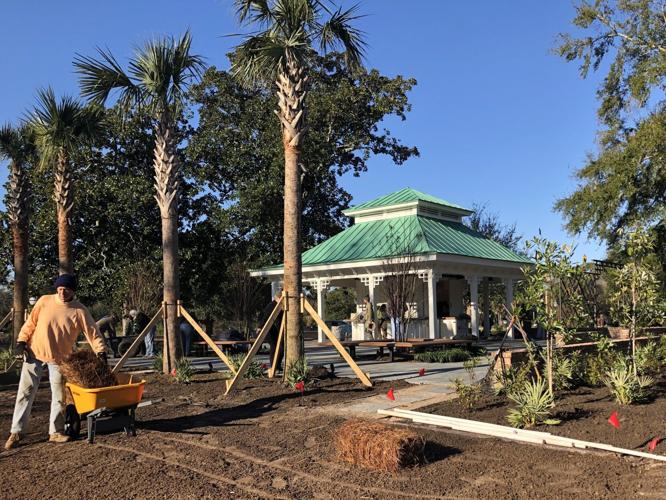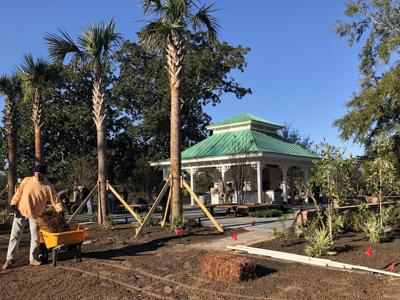The Charleston Parks Conservancy, seeking to make horticulture more multicultural, is starting a new initiative meant to recruit people of color.
The goal of the long-term project is to diversify a $100 billion national industry by training African Americans, Latinos and others, and helping them find positions of influence in their field.
“Horticulture is huge industry, and there are very few people of color in the upper ranks,” Parks Conservancy executive director Tom McGuire said. “We will bring in people with some knowledge and experience, give them an opportunity to spend a year working with us and some of our partners, then place them in leadership roles.”
Bank of America provided a $150,000 grant even before the project was fully fleshed out, McGuire said. That funding, combined with money the Parks Conservancy will raise and budget, will enable the organization to sign up six fellows every 12 months. McGuire said he expects the program to cost as much as $4 million over five years.
Participants will receive the equivalent of $50,000 in salary and benefits for a year’s work.

A big project of the Parks Conservancy in recent years was to renovate Colonial Lake. Charleston Parks Conservancy/Provided
The initiative fits well into the Parks Conservancy’s strategic plan, he said. Historically, the nonprofit has been focused on creating beautiful and useful green spaces. It works in tandem with the city of Charleston. But recently, the board decided to shift its attention to people — getting more of them into the parks, and advocating for equity and inclusion.
Some parks in the area have been renovated, such as Moultrie Park and St. Julian Devine Playground, but others “are not up to snuff,” he said.
McGuire, who became director of the Parks Conservancy earlier this year, spent the past 15 years in Washington, D.C., as a fundraising consultant and a leader of wildlife and education organizations.
He said he has visited the Lowcountry often over the years and has observed a noticeable racial divide and tension.
“So I have an opportunity at the Parks Conservancy to make a difference,” he said. “It’s one of the reasons I’m here.”
He is not alone. The 14 members of the board of directors, who are all White, are similarly eager to change the makeup of the organization and the industry more generally, he said.
Of 15 staff members, three are people of color.
“It’s not enough, but it’s a start,” McGuire said. “We are working hard across the entire board to diversify the organization.”
The fellows they will train potentially could become the future leaders McGuire and his team are seeking.
Shanice Chesney joined the Parks Conservancy as its fellowship program manager in early May, moving to the Charleston area from Atlanta, where previously she was operations manager for Georgia Organics.
She said the Community Horticulture Fellowship Program will coordinate efforts with historically Black colleges and universities, technical colleges and private landscaping and gardening companies in the Lowcountry to identify participants.
She and her team also will reach out to traditionally White institutions, such as Clemson University (a land-grant school), the College of Charleston and various nonprofits, Chesney said.

Parks Conservancy volunteers at work. They spent more than 6,800 hours in the parks during 2020 and had a financial impact of $186,000. Charleston Parks Conservancy/Provided
Training will be provided by the Parks Conservancy and also several key partners, including Moore Farms Botanical Garden, the Charleston’s Parks Department, the Charleston County Park and Recreation Commission, the Charleston Horticultural Society, the Green Heart Project, Clemson University Cooperative Extension, the College of Charleston’s Sustainable Agriculture Program and Trident Technical College’s Horticulture Technology Department.
The curriculum will consist of several focus areas such as garden design, health and nutrition, STEM education and how parks improve quality of life. Fellows will receive personalized training and learn about public-private partnerships, working with government agencies and more.
After a year, they will receive certifications of completion and help from the Parks Conservancy and the American Public Garden Association with finding jobs.
McGuire said the initiative is a result of input from many people. He hopes it will help change an industry that could benefit from various points of view, and help transform the Parks Conservancy itself.
“Doing this kind of work hopefully opens doors to our organization,” he said. “It’s hard to talk about diversity and inclusion if you’re not making some kind of effort.”













